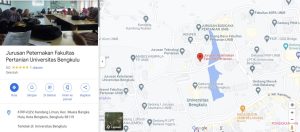HISTORY
BAH (Bachelor in Animal Husbandry) was established on May 10th, 1993, based on the Decree of the Dirjen DIKTI Number 311/DIKTI/KEP/1993. BAH was established to accelerate the livestock development in Bengkulu Province because of its potential in the plantation sectors (palm, rubber, etc.). BAH currently expands its scope in order to keep up with the local and global issues. In other words, BAH is a study programme which is applicable to various fields related to all domestic animals. It also provides opportunities to develop livestock production.
The purpose of the BAH programme is to enable graduates to become managers, entrepreneurs, community leaders, implementers, and developers of animal husbandry science. BAH graduates master the basic knowledge of animal husbandry in order to become leaders in both government agencies and private companies. BAH graduates are also expected to have an entrepreneurial spirit in establishing and developing a business in the livestock sectors, either individually or cooperatively. As the community leaders, BAH graduates are expected to be active in the community development, either in animal husbandry or related fields. In the future, BAH graduates will have an important and strategic role as “agents of change” for livestock development as well as the “promotion agents” for the further quality student candidates.
BAH has been accredited A since 2018 based on the Decree of BAN PT Number 864/SK/BAN-PT/Akred/S/III/2018. Currently, BAH has submitted a Conversion Supplementary Instrument (henceforth ISK- Instrumen Suplemen Konversi) to BAN PT to convert its rating from the A rating system to the excellent ranking system. In 2022, BAH was the only study programme that won the Independent Campus Competition Program (henceforth PKKM -Program Kompetisi Kampus Merdeka) grant. This achievement is expected to accelerate BAH in gaining international recognition.
VISION
To develop sciences and graduates in world class tropical animal husbandry
MISSION
- Organizing contextual education based on animal husbandry science and technology.
- Conducting excellent research in tropical animals and disseminate it.
- Conducting research-based community service in animal husbandry in accordance with community needs.
- Elevating entrepreneurial spirit, information technology literacy, and global insight of students.
LEARNING OUTCOMES
Knowledge and Understanding
- Demonstrating knowledge of fundamental concepts in animal sciences.
- Mastering knowledge and technology in animal production, genetic, nutrition, reproduction, animal product, animal management and entrepreneurship in livestock-based enterprises.
Skills
- Being able to plan, design, implement, and evaluate effective and efficient livestock production systems both individually and cooperatively with a multidisciplinary approach
- Being able to make appropriate decisions in the context of solving problems in the field of animal husbandry based on data and information analysis.
- Being able to maintain and develop a network and the results of cooperation within and outside the institution
Autonomy and Responsibility
- Being able to be responsible for livestock work independently.
- Being able to be responsible for the achievement of teamwork and to supervise and evaluate the completion of the work assigned as their responsibility.
- Being able to communicate and work together in a multidisciplinary team effectively according to business ethics and be responsible for the achievement of the organisation.
GRADUATE PROFILES
- Managers in poultry or livestock farm companies.
- Entrepreneurs who own up to 100.000 laying hens or broilers, goats, and cow/cattle farms and livestock product businesses (salted eggs, yoghurt, and milk etc;
- Community leaders, such as a motivator, a leader in a community, member of house of representative, etc.
- Lecturers and researchers who apply and develop their knowledge at various universities and research institution in Indonesia.
SUBJECT FIELDS
- Basic Animal Science
- Livestock Production
- Animal Nutrition
- Animal Health
- Animal Reproduction
- Animal Product Technology
- Potential Indigenous Animal
- Livestock Management and
- Entrepreneurship in livestock.
Regular study duration: 4 years
Number of ECTS credits: 221.97
Map:


